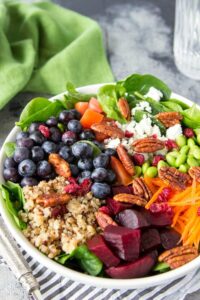
Maintaining a healthy diet can sometimes be a challenge, but with the emergence of superfoods, it has become easier to ensure that we’re giving our bodies the necessary nutrients to function at their best. Superfoods are nutrient-rich foods that have been found to have numerous health benefits ranging from reducing inflammation to lowering the risk of heart disease. This blog post delves into what superfoods are, the positive benefits they bring to our bodies and the health benefits of incorporating them into our diets.
Blueberries: This tiny fruit packs a punch when it comes to nutritional value. Blueberries are high in antioxidants, which help protect the body from cell damage caused by free radicals. They are also known to improve brain function and memory. Consuming blueberries regularly has been linked to a decreased risk of heart disease and cancer. These little powerhouses are easy to add to your diet – try adding them to your smoothies, or oatmeal, or simply enjoy them as a snack.
Kale: Widely touted as one of the most nutrient-dense foods on the planet, kale is a leafy green superfood that is loaded with vitamins C, K, and A. It’s also packed with antioxidants, making it an excellent choice for reducing inflammation and lowering the risk of cancer. Studies have also linked kale to a decreased risk of heart disease, thanks to its cholesterol-lowering properties. You can eat kale in many ways – add it to your salads, sauté it with garlic, or bake it into crispy chips.
Salmon: This oily fish is an excellent source of protein and omega-3 fatty acids, which are essential for brain function and improving heart health. Salmon is also known to have anti-inflammatory properties, making it a great choice for people with autoimmune disorders. Eating salmon regularly has been linked to a lowered risk of depression, arthritis, and high blood pressure. Try grilling or baking salmon for a healthy and tasty meal.
Quinoa: A gluten-free grain, quinoa is a complete protein that contains all nine essential amino acids. It’s also rich in fiber and antioxidants, making it an ideal food for reducing inflammation and improving digestion. Studies have linked quinoa to a lowered risk of heart disease, type 2 diabetes, and high blood pressure. You can eat quinoa in many ways – try it as a base for salads, add it to soups, or use it as a substitute for rice or pasta.
Sweet potatoes: This root vegetable is an excellent source of vitamins A and C, fiber, and potassium. Sweet potatoes are also low on the glycemic index, meaning they won’t spike your blood sugar levels. They’re known to have anti-inflammatory properties, making them a great choice for people with arthritis and other autoimmune disorders. They may also have cancer-fighting properties. Enjoy sweet potatoes by roasting them, mashing them or baking them as fries.
Superfoods are the key to a healthy and balanced diet. They’re easy to incorporate into our diets, and the benefits they bring are worth the effort. Whether you’re looking to improve your brain function, reduce inflammation or lower the risk of heart disease, there’s a superfood out there for you. So, start adding these nutrient-dense foods to your meals today and experience the positive benefits they bring!


Follow Us